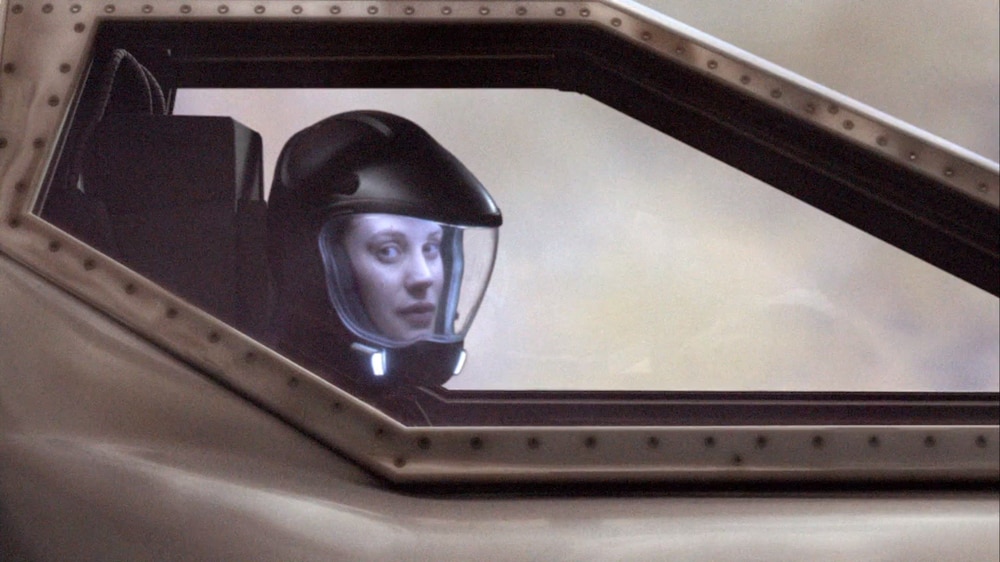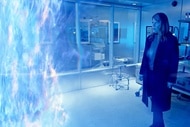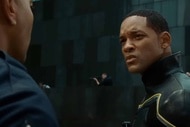Create a free profile to get unlimited access to exclusive videos, sweepstakes, and more!
In praise of the metaphysical flourishes of 'Battlestar Galactica'
The beloved military sci-fi series was made better by its ability to get weird.

Ronald D. Moore's reimagining of Battlestar Galactica emerged in the mid-2000s with several driving forces behind it both creatively and commercially. In developing the series, Moore drew on post-9/11 anxieties of American life and security, as well as his own frustrations with the limitations he'd experienced while working on the Star Trek franchise. For him, Battlestar was an opportunity to get rougher, more raw, to take the "opera" out of "space opera."
Looking back on the show today, nearly 20 years after its debut, you can definitely see those themes and concerns arguably even more clearly than you could when the series premiered in 2004. Moore's vision of Battlestar Galactica is one of realistic, often achingly dark military science fiction, with a focus on the political, social, and psychological implications of prolonged war, the plight of refugees, and the constant balance between liberty and safety, if such a balance could ever be achieved at all. Longtime fans of the series, myself included, cite this sense of gripping realism embedded amid the Vipers and Cylon Centurions as one of the key reasons the show worked so well.
But realism is not the whole story, and neither is the lived-in feel of the show's design, or the grounded character work, or the real-world parallels the series often drew from to tell stories of the Colonial Fleet and its constant battle for survival. Looking back at Battlestar Galactica now, I remember some fans who grew disappointed when the show leaned away from realism and into something more like magic realism, taking on a certain metaphysical sense of story logic to guide the series to its final resolution. For some fans, it seemed at odds with the initial approach, evidence that perhaps the show had lost its way, changed its concerns, or both. But looking back on it now, it's clear that the sense of metaphysical weight was always a part of Battlestar Galactica, and building it so elaborately and completely into the show's final two seasons makes the whole thing more compelling.
The more metaphysical aspects of the series were on display in some form or another from the very beginning, from Gaius Baltar's continuous efforts to discern reality from the various visions Cylon Six seems to be granting him to the hidden Cylons and their reckoning with their own existence to the very presence of the human-Cylon hybrid child, Hera Agathon. But even with all of these elements in play throughout the series, nowhere is Battlestar's sense of magical thinking and philosophical power felt more acutely than in the arc of Kara "Starbuck" Thrace, played by Katee Sackhoff.
Starbuck begins the series as a rough, sometimes self-destructive pilot who's most often interested in the tangible things in her life, whether that's sex or the cockpit of her Viper. Then, in Season 3, things start to shift. Starbuck's grip on what's real, on what she can affect in her life in a tactile way, transforms into something else as she slips away from the fleet during an explosion, then somehow returns by season's end, not just apparently alive, but claiming that she knows the way to Earth. It's a moment that had many fans scratching their heads, but it ultimately pays off with the resolution to the entire series.
In the fourth and final season of Battlestar, all of creator Ronald D. Moore's explorations of myth and prophecy, visions and dreams, consciousness and free will, are brought to bear on the mission to save Hera and finally reach Earth no matter what. For Starbuck, that means drawing not just on her years of experience, but on her investment in music, to somehow save everyone. In the three-part series finale, she realizes that she can use musical notation to create a set of coordinates, tied ultimately to the song "All Along the Watchtower," to create a jump path for Galactica to escape a Cylon attack. What she finds on the other end of that jump, the leap of faith to end all leaps of faith, is Earth, the home the Colonial Fleet and its survivors have been waiting years to see.
If you're not paying close enough attention, this resolution to a series that began as the story of the human race fighting to survive a devastating and often devastatingly realistic alien attack can seem too convenient, a deus ex machina pulled from the blue when she show simply needed to wrap things up. In the grander scheme of things, though, it fits in perfectly with the show's overall mission to show us how humanity can endure and even prevail. By setting the finale's version of Earth millennia in the past, Moore and company give us not just the story of Galactica finding a new home, but a new version of the myth of Prometheus, the birth of modern humanity via the arrival of a new strain of the species from the stars. The survivors of the show descend like angelic figures, making the noble choice to give up their technology and basically start over with nothing but the wisdom they've gained. In Starbuck's case, the angelic angle becomes literal, as she vanishes at the end of the show like a magical figure, having fulfilled her purpose to bring her friends to Earth at last.
In positioning Starbuck in this literal angelic pose by the end of the show, and making her journey to arrive there as much about art (music) as it is about science (starships and jump drives), the show makes a concluding statement that values creativity and beauty as much as it does tactical prowess. Hera wrote some musical notes with crayons, Starbuck transposed them into a melody, and together they created salvation and a future for humanity. It's a magical piece of storytelling that proves Battlestar Galactica was always a metaphysical journey as much as it was a physical one, and it helps cement the show's position as one of our great sci-fi stories.
Relive Battlestar Galactica from the beginning as part of SYFY Rewind, airing Fridays on SYFY this summer. The entire series is also streaming now on Peacock.














